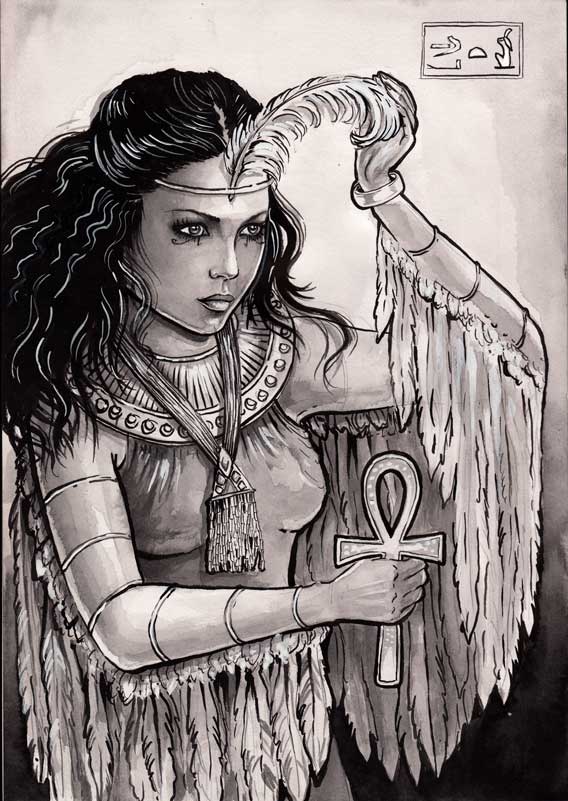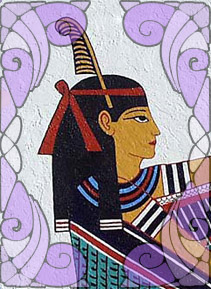Maat is the Egyptian Goddess who personifies the force that moves the stars, the seasons of the year and the actions of Gods and mortals since the creation of the world out of chaos.
Also known as Mayet, she is the daughter of Ra and wife of Thoth. This Goddess represents the principle of morality and ethics that every Egyptian should follow daily, always acting with honor and truth when the situation involves family, community, nation, environment and the Gods.
Attributes: Goddess of harmony, justice and truth
Symbols: Ostrich feather
Place: Egypt
The force opposite to her is called Isfet, or chaos itself. The ancient inhabitants of Egypt considered that everything beyond the Nile was chaotic, while in the area around them the order prevailed. Together, these two forces brought balance to the world in which the people lived, being important parts of their daily lives. The term Isfet represents the dualism in which Egyptian life was so strongly based.
In addition to her role in the balance of the universe, she has the responsibility of “weighing” souls (or “weighing” the heart) in the underworld, known as Duat. Her feather was used as the measure of whether the souls of the dead would reach paradise in the afterlife or not.
This Goddess is usually depicted in the form of a woman standing or sitting, with wings coming out of her arms, just like Goddess Isis. Sometimes she can be seen holding a scepter in one hand and an ankh (symbol of eternal life) in another but always with the ostrich feather on her head. In fact, in less frequent representations, she had no head, only the feather would be in its place. This apparatus is the symbol of her whole being, the representation of order and balance, and also a hieroglyph for “truth.”
The ancient law

Maat was associated with justice and law in ancient Egypt. From the 5th dynasty (about 2510-2370 BCE), the responsible for trials was called the Priest of
He also had the feather drawing drawn on his tongue with green paint, so he would only speak the truth. The Priest decided all earthly judgment according to the nature of the law that had been violated, with punishments ranging from corporal to capital punishment.
Crimes such as cases of envy, dishonesty, greed, unfairness, laziness and ingratitude were considered crimes against Maat and the Egyptian guilty of the crime was considered to violate the spirit of the Goddess requiring another judgment in the underworld during the weighing ceremony in the Hall of the Two Truths.
Summoning Maat
We can make a ritual for this Goddess in a moment where there is a lack of balance or justice in our lives. Maat is karma itself, and with a sincere request, she will bring the necessary adjustments into our days.
Necessary Items:
- 1 feather
- 1 ankh
- Oil of rose or sandalwood
- 1 white candle
- Incense (rosemary, white rose or sandalwood)
- 1 Amethyst
- Location of the cardinal points
Arrange your altar and purify yourself in the usual way, already thinking about the goals you want to achieve. Facing the east, light the candle and place it in the center of your altar. Take the feather and run it through your body, especially touching the top of the head, forehead, heart, hands and feet. This is a time of growth and renewal.
Light the incense and let the smoke pass through the same points on the body.
Take the ankh with your dominant hand and the amethyst with the receptive hand. Be comfortable and feel the Goddess, visualizing her with your third eye. You can speak out loud or just mentalise the situations you want the Goddess to help you work with. Be sure to talk honestly with her, about how you feel about what you want to change, giving as much detail as you can.
Stop. Listen and do not discard the ideas that come to your mind, hence it is Maat speaking. When you think you have the solution, bend over and thank the Goddess. Wear some of the oil of rose or sandalwood on the third eye region and meditate on the steps you will take to bring balance back into your life. Close the circle and thank the Goddess again. Let the candle burn completely.
Now whenever you feel that you need Maat’s help, just hold the ankh and the amethyst in your hands and she will come to you.

